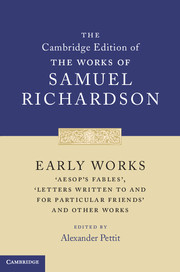Book contents
- Frontmatter
- Dedication
- Contents
- General Editors’ Preface
- Acknowledgements
- Chronology
- List of Abbreviations
- General Introduction
- Textual Introduction
- The Apprentice’s Vade Mecum (1733)
- A Seasonable Examination of the Pleas and Pretensions (1735)
- Preface to Aubin, A Collection of Entertaining Histories and Novels (1739)
- Aesop’s Fables (1739)
- Letters Written to and for Particular Friends (1741)
- Six Original Letters Upon Duelling (1765)
- Appendix: The Infidel Convicted (1731)
- Postscript
- Emendations
- Word-division
- Bibliographical Descriptions of Early Editions
- Explanatory Notes
- Index
Familiar Letters on the Most Important Occasions in Common Life: Letter I
Published online by Cambridge University Press: 30 June 2022
- Frontmatter
- Dedication
- Contents
- General Editors’ Preface
- Acknowledgements
- Chronology
- List of Abbreviations
- General Introduction
- Textual Introduction
- The Apprentice’s Vade Mecum (1733)
- A Seasonable Examination of the Pleas and Pretensions (1735)
- Preface to Aubin, A Collection of Entertaining Histories and Novels (1739)
- Aesop’s Fables (1739)
- Letters Written to and for Particular Friends (1741)
- Six Original Letters Upon Duelling (1765)
- Appendix: The Infidel Convicted (1731)
- Postscript
- Emendations
- Word-division
- Bibliographical Descriptions of Early Editions
- Explanatory Notes
- Index
Summary
To a Father, against putting a Youth of but moderate Parts to a Profession that requires more extensive Abilities.
Dear Sir,
You pay me a Compliment, tho’ a very obliging one, when in the last Letter you favoured me with, you desire my Advice, with respect to the Disposition of your Son William; whom you are inclin’d to bring up to the Bar. If, in complying with your Request, I should say any thing you may not intirely approve, you will not have so much room to blame me, as your own wrong Choice of a Counsellor.
I need not now tell you, I have a good Opinion of Will; and think him a modest, grave, sober Youth: But, for this very Reason, I hardly think him qualified for the Profession you would chuse for him; for, I doubt, he has neither Talents for the Law, nor ever will have the Presence of Mind necessary to make a Figure at the Bar. In any smooth, easy Business, he will probably succeed, and be a useful Member of the Commonwealth. And as he is not your eldest Son, I should, were it to me, put him to a Merchant; or, as we live in an Island, and Trade and Navigation are both our Riches and our Glory, I should not even scruple to put a second Son to a creditable wholesale Dealer, rather than fail; if he himself is not averse to such a Calling. For I know not (you’ll excuse me, I’m sure) whether Will 's Genius is equal to that of an universal Merchant: For, the various Springs of Commerce, the Seasons for chusing proper Commodities, and numberless Incidents that make a necessary Return of Gain precarious, are full Imployment for the strongest Judgment; as a Man, by one ill-chosen Venture, often loses more than he gains by several successful ones.
But this Opinion of Will, should you think it just, will be no Obstacle to his succeeding in the World in some creditable easy Business. Tho’ I think him unequal to the Part you seem inclinable to allot him; yet he is no Fool: And Experience teaches us, that, in some sorts of Business, ample Advantage may be made by very moderate Talents, with much Reputation.
- Type
- Chapter
- Information
- Early Works'Aesop's Fables', 'Letters Written to and for Particular Friends' and Other Works, pp. 334 - 336Publisher: Cambridge University PressPrint publication year: 2011

